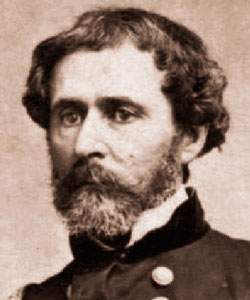John Charles Fremont (Congressional Biographical Directory)
Reference
FRÉMONT, John Charles, (son-in-law of Thomas Hart Benton), a Senator from California; born in Savannah, Ga., January 21, 1813; pursued classical studies and attended Charleston College 1828-1830; instructor in mathematics in the United States Navy 1833-1835; civil engineer assistant 1838-1839, exploring the territory between the Missouri River and the northern boundary of the United States; appointed second lieutenant of Topographical Engineers of the United States Army 1838; commenced in 1842 explorations and surveys for an overland route from the Mississippi to the Pacific Ocean; major of a battalion of California Volunteers in 1846; appointed lieutenant colonel of United States Mounted Rifles in 1846 and ordered to act as Governor of California by Commodore Stockton; General Kearny, United States Army, revoked this order and placed him under arrest for mutiny; tried by court martial, found guilty, and pardoned by President James Polk, but resigned; settled in California on the Mariposa grant; commissioner to run the boundary line between United States and Mexico in 1849; upon the admission of California as a State into the Union was elected as a Democrat to the United States Senate and served from September 10, 1850, to March 3, 1851; unsuccessful as the first Republican candidate for president of the United States in 1856; appointed major general in the United States Army by President Abraham Lincoln in May 1861 and placed in command of the western military district; removed in December 1861; appointed to command the mountain department in February 1862 and resigned in June 1864; again nominated for president in 1864; Governor of Arizona Territory 1878-1881; appointed a major general in the United States Army on the retired list 1890; died in New York City on July 13, 1890; interment in Trinity Church Cemetery; reinterment in Rockland Cemetery, Nyack, N.Y., March 17, 1891.
“Fremont, John Charles,” Biographical Directory of the United States Congress, 1774 to Present, http://bioguide.congress.gov/scripts/biodisplay.pl?index=F000374.
John Charles Frémont, Mexican War (American National Biography)
Scholarship
When confirmed reports of war with Mexico reached the Pacific, the U.S. Navy seized California ports. Commodore Robert F. Stockton named Frémont commander of the California Battalion, which helped to occupy the province. In the winter of 1846-1847, during a revolt centered in Los Angeles, Frémont became entangled in a quarrel between Stockton and late-arriving General Stephen Watts Kearny of the army, both of whom claimed supreme authority in California. When Frémont, an army officer, rashly sided with Stockton, who had named him governor, Kearny marched him east in disgrace to face a court-martial. Despite widespread public support and Benton's personal defense of him during the long, rancorous trial, Frémont was found guilty and dismissed from the army. Although President Polk reinstated him for "meritorious and valuable services," Frémont bitterly resigned.
Pamela Herr, "Frémont, John Charles," American National Biography Online, February 2000, http://www.anb.org/articles/05/05-00252.html.
John Charles Frémont, Election of 1856 (American National Biography)
Scholarship
Frémont reentered politics in 1856. With crucial early support from Nathaniel Banks and Francis Blair, Sr. (1791-1876), he became the first presidential candidate of the newly formed Republican party on a platform opposing the extension of slavery. Chosen more for his heroic image than his political skills, he nonetheless inspired great enthusiasm in the North, while in the South he was branded a "Frenchman's bastard" and, incorrectly, a secret Roman Catholic. Although Frémont gained the majority of northern votes, he was defeated nationwide by the Democratic candidate, James Buchanan (1.8 to 1.34 million, with an electoral vote of 174 to 114). Despite the loss, his candidacy established the Republican party's dominance in the North and set the stage for Abraham Lincoln's victory in 1860.
Pamela Herr, "Frémont, John Charles," American National Biography Online, February 2000, http://www.anb.org/articles/05/05-00252.html.







